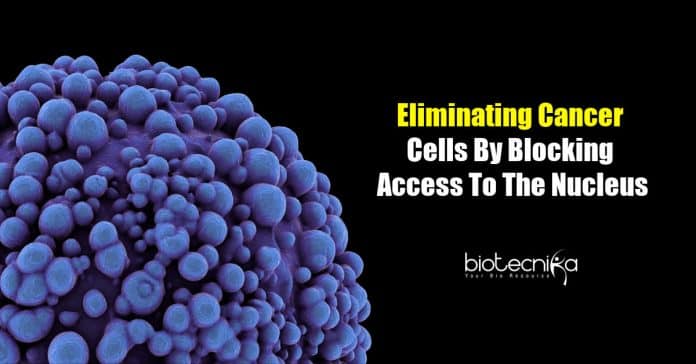The gate to the nucleus, Nuclear Pore Complex, blocked to keep Cancer Cells Out
The nucleus is the central organelle in the cell both positionally and functionally. The nucleus organizes and stores genetic information while isolating this important information from other cellular organelles. Although the nucleus is separated from other organelles, it needs to communicate with the other components in order to exchange RNA and proteins. The secure and targeted exchange of components between the nucleus and the cytoplasm is maintained by the Nuclear Pore Complex (NPC) in the cell. A study by researchers at Sanford Burnham Prebys Medical Discovery Institute showed that on blocking these NPC channels aggressive tumors in mice shrank leaving healthy cells unharmed.
Maximiliano D’Angelo, associate professor, Sanford Burnham Prebys, explains the relation between NPC and cell growth. In order to enter the cell nucleus, all materials have to pass through Nuclear pore complexes that behave as ‘doors’ to the nucleus. The rapidly dividing cancer cells need to create more nuclear ‘doors’ for the growth of these dividing cells. This study “Inhibition of Nuclear Pore Complex Formation Selectively Induces Cancer Cell Death,” is the first study to demonstrate that the cancer cells can be selectively killed
by blocking the formation of the nuclear ‘doors’.The researchers noted that there is evidence which shows the presence of increased NPC number in the cancer cells and their addiction to nuclear transport machinery. However, the relationship between a reduced number of NPCs and the physiology of normal and cancer cells has not been investigated. Also how this relationship can be exploited to develop therapies has not been studied.
In order to investigate it, the team of researchers transplanted human tumor cells that are unable to form NPCs into mice. Three different tumor cell types were tested: leukemia, melanoma, and colorectal cancer which are known to rely on NPCs. It was observed that all these mice showed smaller tumors and slower growth.
The researchers reported that NPC formation inhibition causes cancer cell death selectively, prevents the growth of the tumor, and induces regression of the tumor. While in response to NPC assembly inhibition the cancer cells die, the normal cells undergo cell cycle arrest. This reversible process enables the cells to survive.
The team demonstrated that for the rapidly growing cancer cells inhibition in building nuclear pore channels is devastating, but healthy cells remained unharmed and unaffected by the inhibition. Stephen Sakuma, the first author of the study, stated that their findings could lead to new cancer treatment and their work provide important proof of the concept. Treatment designed considering the findings of their work would be beneficial for metastatic or aggressive cancers, that are difficult to treat.
In the future researchers would work to find drugs to block nuclear pore complex formation. This research blocks the door on cancerous cells and opens doors to new strategies and treatments. Their study may not only open the possibility for colorectal cancer, leukemia, and melanoma treatments but even may lead to the discovering treatments against drug resistance.
D’Angelo remarked that they envision that their drug candidate might be able to prevent drug resistance along with being able to cure tough-to-treat cancers. Resistance to drugs occurs when the tumor adapt properties that help them resist therapy. In an environment where their doors are removed, tumors will have a hard time adjusting in it, hence this candidate drug might come to rescue particularly for treatments such as targeted therapies to remain effective for longer periods of time.
The study was published in Cancer Discovery.
Author : Mayuree Hazarika






























